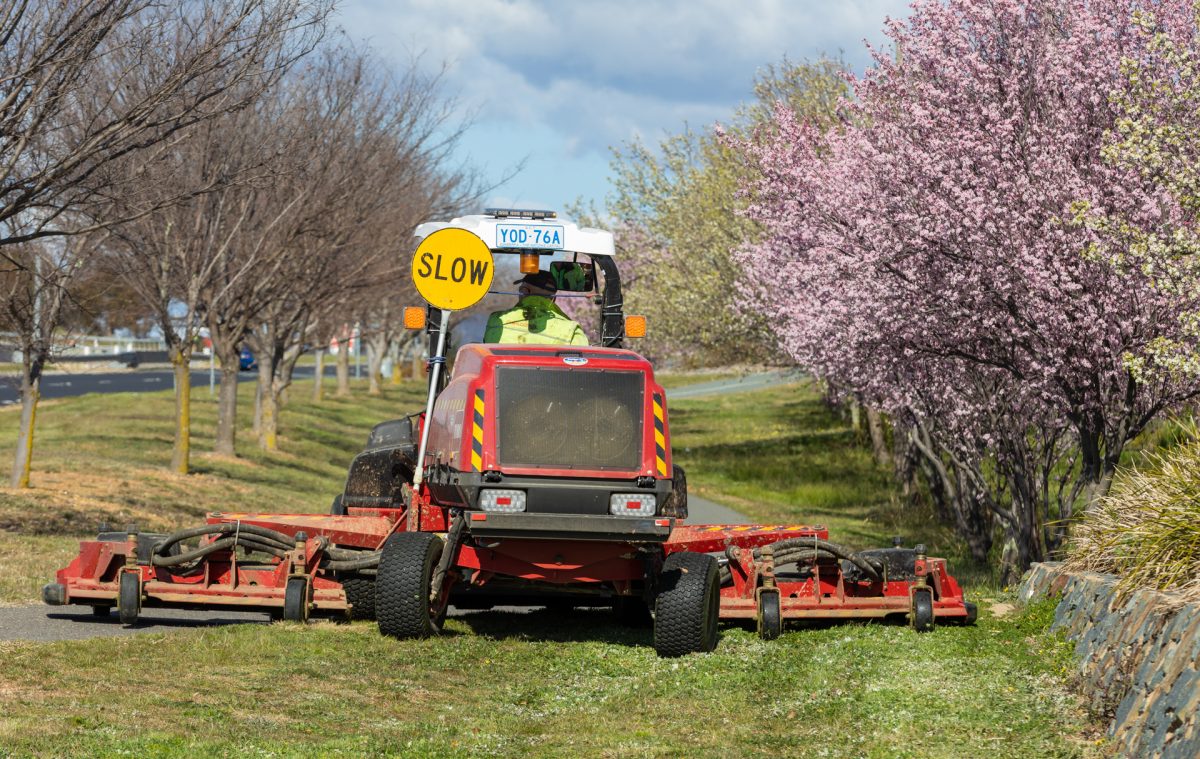
Lisa Randone is pregnant with her second child and suffers asthma. Photo: James Coleman.
Just as you may think you have stored away your antihistamines and Ventolin puffers for some time, ‘That Pollen Guy’ at the Australian National University (ANU) has bad news.
“‘Is the hay fever back?’, I hear you ask,” Professor Simon Haberle tweeted on 16 February 2023.
“Well, I’m glad you asked because yes, we are seeing a rise in the counts for airborne allergenic pollen (Chinese Elm) and the spore Alternaria.”
Australia has one of the highest rates of asthma in the world and while Melbourne might claim the dubious honour of ‘Thunderstorm Asthma Capital of Australia’, Canberra is a close second. Our combination of dry weather and abundant vegetation spells misery for many asthma-sufferers.
Of course, there is an array of medications and treatments out there. And both the National Asthma Council of Australia and ACT Health recommend that – no matter the severity – you have an ‘asthma action plan’ for when it really gets bad.
But what about when you fall pregnant? That’s when it all fell to pieces for Lisa Randone.
Aged 33, Lisa has suffered asthma as long as she can remember, from growing up in Italy to where she is now, married and 30-weeks pregnant with her second child.
“I don’t struggle too much, but there are periods of three weeks to a month once a year when I cough so much I can’t sleep, especially at night during winter, when it’s cold,” she says.
She says it did improve with time, helped by not only learning not to panic “which doesn’t help” but also avoiding the cold, alcohol and standing too close to smokers.
“I know how to manage it now.”

Fresh grass being cut in Canberra. Photo: Michelle Kroll.
She has her treatments down to a fine art too. The acute attacks are usually kept at bay by a preventer (or inhaled corticosteroids), unlike when she was in Italy “using Ventolin constantly … and having more regular examinations”.
“Here, it’s more about keeping the symptoms under control.”
At least until she fell pregnant with her first child. She remembers waking up one night with an acute attack, briefly contemplating heading to the emergency department before deciding instead to quickly Google each medication to find out if it was safe to take.
“I was really worried about what kind of medications I could or couldn’t take.”
Professor Vanessa Murphy from the Hunter Medical Research Institute (HRMI) says there are so many people in Lisa’s boat, and not just among the hoi polloi. Midwives and pharmacists aren’t always sure. It’s why she’s rolling out the new ‘Breathe Well for Your Baby Program’ across Australia – and thanks to $264,160 of funding from the ACT Government under the ‘Healthy Canberra Grants’ – starting here.
“About 40 per cent of women with asthma experience worse symptoms during pregnancy,” she says.
“Unfortunately, there’s lots of data showing many women drop their asthma prescriptions during the first trimester, because they think it might not be safe to take. That’s not true and is one of the myths we want to bust.”
The “world-first” program is developed by researchers at HRMI and University of Newcastle along with more than 50 expert clinicians and scientists from around the world. Vanessa describes it as a “digital toolkit” or “online resource for both families and health professionals”.
“It brings together all the latest evidence-based information into once place and covers things like asthma management goals for pregnant women, recommendations for asthma medication use, and safety profiles of asthma medications.”

Hunter Medical Research Institute (HRMI) Asthma and Breathing Program Associate Professor Vanessa Murphy. Photo: James Coleman.
The launch will be accompanied by a public awareness campaign and face-to-face workshops with GPs, midwives, and obstetricians.
“We haven’t had a lot of feedback yet, but it’s been endorsed by the National Asthma Council of Australia, Internal Medicine Society of Australia and New Zealand, and the Capital Health Network. It’s great to see those professional bodies get behind it.”
And there’s also Lisa.
“It really addressed my fears,” she says.
“There’s a very nice table where you can see a list of all the medication that’s safe to take. And rather than have to book an appointment with a doctor for the next day to ask questions, I can find answers straight away.”
Find the Asthma in Pregnancy Toolkit here.













